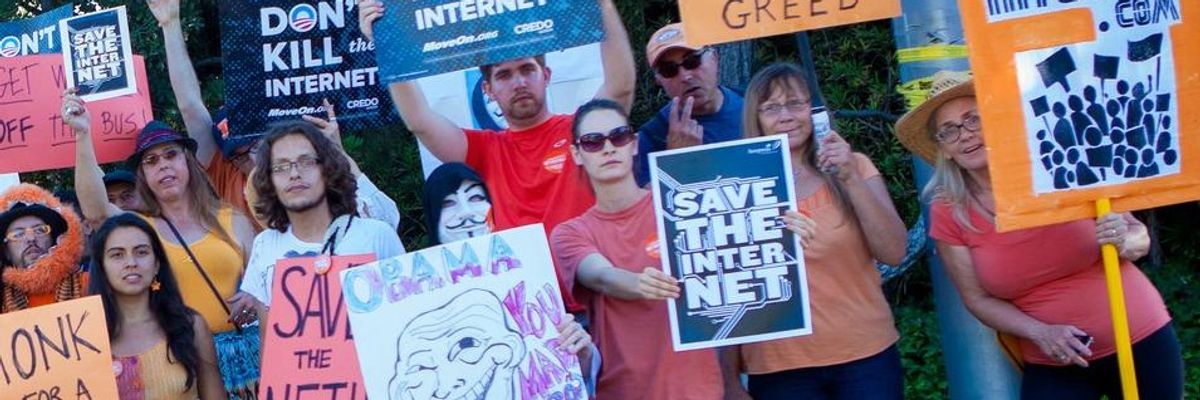Bernie Sanders is far and away the best presidential candidate for those who care about internet freedom and access, the tech policy advocacy group Free Press Action Fund has found.
The Republican contenders generally disdain internet freedom, the group discovered, and Donald Trump in particular presents the most dire threat to a free and accessible internet this election cycle.
"It is absolutely essential that the Internet remain open and free of censorship or the chilling effects that result in self-censorship," Sanders said as he argued against the Protect IP Act (PIPA), a bill which would have "blacked out parts of the internet," Free Press Action Fund noted in its "internet voter" guide to the candidates' positions.
In the group's comparison of the 2016 candidates' platforms, Sanders comes out ahead of all others when it comes to issues that internet activists prioritize: protecting free expression online, fighting for affordable broadband access, working against cable monopolies, supporting local broadband companies, battling against mass surveillance, and supporting net neutrality.
The only category in which Sanders scored less than a top score was encryption. In February, the Vermont senator argued that "a middle ground can be reached" in the FBI's fight to force Apple to break into one of the suspected San Bernardino shooters' iPhones. No candidate received a top rating in this category.
Where Sanders scored well, Trump scored abysmally. Trump believes, for example, that "the government needs to shut down the internet to keep America safe," while simultaneously claiming that "the FCC's Net Neutrality protections are an 'attack on the internet' that would 'target conservative media,'" giving him poor scores in the categories of internet freedom and net neutrality.
"We've been scouring the transcripts of the debates produced by the networks that host them," Tim Karr, senior director of strategy for Free Press Action Fund, explained to the Guardian. "We've gone through the candidates' websites to see if there's anything that relates to the issues in their campaign platforms, and we've been bird-dogging."
"Indeed, the group's staffers have been attending stump speeches, rallies and other public events to ask the specific policy questions that, across the board, the candidates don't seem prepared to answer," the Guardian noted.
In general, the most difficult aspect of the analysis was confronting the candidates' ignorance of key tech policy issues. The newspaper reported:
Simple ignorance is a problem that crosses party lines, said Karr, and it's an acute one in a country where net neutrality and anti-surveillance activism have crossed those lines as well. "We think that there's a constituency out there, what we call the internet voter, that has already demonstrated his or her passion on this issue," Karr said.
"More than 10 million people got involved protesting the PIPA [the Preventing Real Online Threats to Economic Creativity and Theft of Intellectual Property Act] and SOPA [the Stop Online Piracy Act] legislation," he said.
"The candidates by and large haven't caught up with this new constituency."
The Republicans, in particular, are "out of step" with their voting base, according to Karr, who told the newspaper that the issue of net neutrality is one with bipartisan support. Polls even show that a majority of Republican voters support it, Karr said to the Guardian, and yet nearly every Republican candidate has taken a stand against net neutrality on the campaign trail (John Kasich's position on the issue is unknown).
"There's a difference between what these politicians are saying and what their voting base believes," Karr lamented to the Guardian.
Clinton and Sanders are the only presidential candidates who have argued in favor of net neutrality to date.
Overall, the Republican candidates scored very badly--but they also couldn't be ranked in some areas, such as the issues of "industry consolidation" and "local competition," suggesting that the Democratic candidates have been pushed to take positions on issues that the Republicans have thus far been able to continue to ignore.
Raising the alarm about the ignorance of most of the 2016 candidates, Free Press Action Fund argues that its concerns are extremely urgent. The group writes, "No other communications medium in history has had such vast potential to help drive social change and improve the lives of so many so quickly. And yet the Internet's benefits have not been evenly distributed. We need to ensure that the Internet serves the public--and doesn't harm communities by furthering inequality or discrimination."
